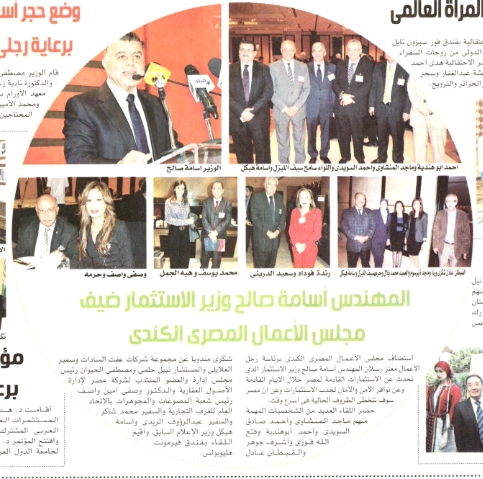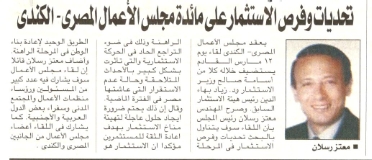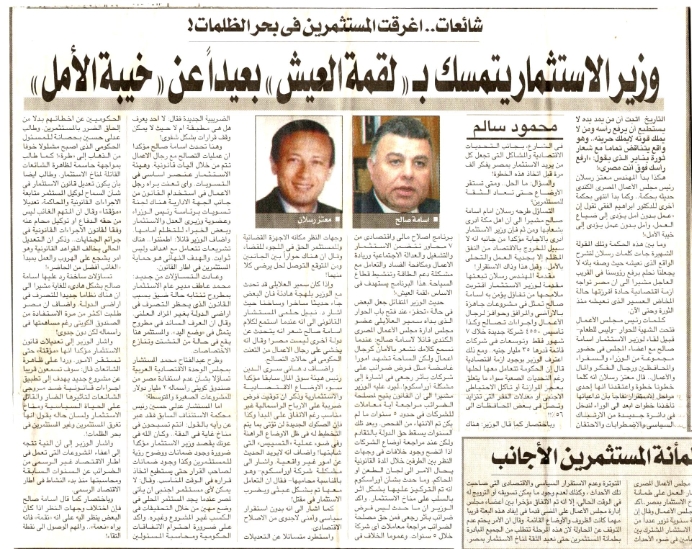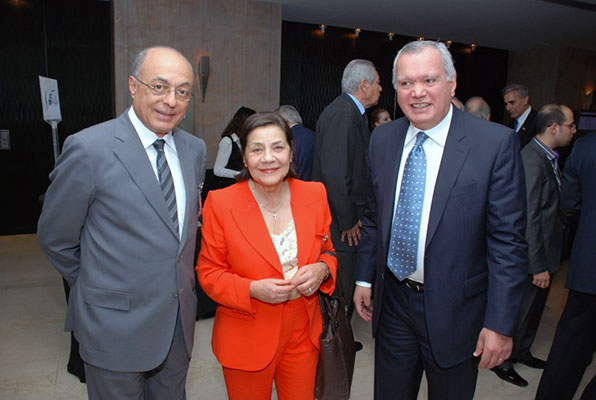
Date
Speaker(s)
Designation
Description
The Canada Egypt Business Council (CEBC) hosted a special event and panel discussion featuring H.E. Osama Saleh, Egyptian Minister of Investment. The discussion revolved around the impact of the current political turmoil on investment and means of mitigating this impact to eventually restore to Egypt its appeal to investors.
Over 250 distinguished attendees were present at the event, from distinguished ministers, ambassadors, CEBC members and guests, among who were Governors of Ismailia and BaniSweif, former ministers Dr. Ibrahim Fawzi, Dr. Amr Ezza tSalama, Dr. Hany Helal, Dr. Ahmed Zaki Badr, Dr. Alaa Fahmy, Counselor Adly Hussein and H.E. David Drake, the Canadian Ambassador to Egypt in addition to several esteemed ambassadors and members of parliament.
CEBC Chairman, Mr. Motaz Raslan, delivered the opening remarks for the discussion by saying “Him who does not own his bread, does not own his freedom. Him who extends out his hand, does not hold his head high.” He expressed his disappointment that unfortunately this reality contrasts with a famous slogan, often chanted during the January 25 Revolution, “Hold your head up high, you are Egyptian”. He sees that Egypt is going through a critical economic crisis mentioning elements increasing the severity of the situation such as the low value of the Egyptian pound and the scarcity of foreign currency in Egypt, which he described to be a main deterrent of investment in Egypt. He stressed that stability and investment go hand in hand and one leads to the other.
The Chairman also announced a business delegation visiting Canada from members of the council in an endeavor to attract investment to Egypt. The council organized regular visits by businessmen to Canada until the eruption of the January 25 revolution.
Raslan left the floor to Minister Saleh, minister Osama Saleh held the position of Chairman of Egypt’s General Authority for Free Zones and Investment before his appointment as Minister of Investment. He also served as Regional Manager of American Express Bank. The Minister commenced his word describing investment as the main catalyst for development. Saleh also gave an overview of the current situation. He said that after the revolution, the transitional period was dominated by politics, up to the election of the first democratically elected civil President. The Minister added that the revolution left the Egyptian people with great expectations; unreasonable expectations, which were an overwhelming burden on the consecutive cabinets and ministers since the revolution. Recalling the union of all factions of society that crowned the Egyptian revolution, the Minister said, “We all need to reach consensus where we find common grounds…and I find that this for us is the economy…our breadwinning.”
The Minister spoke of having to constantly manage crises, as opposed to dealing with economic problems in normal circumstances. He highlighted that ongoing crises are occupying the current government even if the long-term focus on investment should be the priority. He added that they are rightly doing so, because these crises are severe and require immediate action.
In the context of shedding light on the Ministry’s plan to get Egypt safely out of the current economic crisis, the minister spoke of the program for launching the national economy, which was planned by the government. The program was submitted to the IMF (in an attempt to receive a 4.8 billion USD loan) in December of last year, but due to civil unrest was delayed, the minister said.
On the program, Minister Saleh said that despite the cost the people will pay for the measures included in the project (imposing additional taxes, lifting subsidies…etc.), the benefits would be many. He highlighted that the project is focused on investment and creating new jobs and not at shrinking expenditure solely. “Learning from our past experiences, we put into consideration that social justice needs to be an undetectable part of investment decision making, but in a manner that does not hinder investment” the minister said.
The minister also mentioned other axes of the program, which included integrating youth and entrepreneurship, and fighting corruption. Saleh recognized that the challenge posed by scarcity of energy productsand that posed by the crisis tourism is going through, are immense.
Speaking of investment in Egypt, he said that the Egyptian economy was on the forefront of attractive investment destinations for the past 10 or 11 years. The ministry’s priorities now are to maintain investors, who are already operating in Egypt, and to preserve the infrastructure, which would cost Egypt huge funds to restore, if damaged. He described the inflow and outflow of foreign currency in details, explaining that despite the numbers reflecting high rates of outflow, they do not depict the expansion in existing businesses, which comprise injecting the economy with around 35 billion Egyptian pounds. The Minister said that between July 2012 and February 2013, more that 4550 enterprises have been established, with a capital of around 8 billion Egyptian pounds. He also highlighted that growth in the stock market over 2012 was the second largest worldwide, at 51%, explaining that while this is due to the sharp decline in 2011, it is still reason to be optimistic. He said that the number of transactions has also matched that of 2010 and possibly 2009. Saleh spoke of the ministry’s draft legislation on sukuk (Islamic bonds), which would be an instrument of funding for Egypt.
“The Sukuk has been a source of concern, but it is in fact similar to regular bonds”, Osama said. He explained the motivation behind putting forth this legislationis that there are investors who would not proceed to invest in any form of investment that is suspect of involving any degree usury. He added that this type of investment is particularly beneficial as the investor is willing to endure losses and is aiming at long-term gain to some degree.
The Minister provided some insight into other efforts the Ministry is undertaking. He mentioned attempts to expedite business licensing and said that there is significant progress in this regard. The informal sector is also a subject of attention to the ministry, where it is trying to ease obstacles for their legalizing. He highlighted a number of ‘ready’ investment opportunities. He also gave an overview on the major projects that Egypt is currently promoting, based on its unique strategic position. In this context, he quoted Napoleon Bonaparte saying, “There is only one Egypt” and explained the ministry’s vision for the Suez Canal development, the Technology Valley, a port for minerals exportation in Safaga, among other projects.
Upon conclusion of his word, the floor was opened for questions. The esteemed guests raised questions regarding a number of issues. The first was on the Sawiris family (a family owning massive enterprises in Egypt, comprising a significant percentage of Egypt’s stock market) and the difficulties they have been facing lately. The family has been facing charges of tax evasion. The Minister responded saying that the tax authority is entitled worldwide to audit previous transactions. He added that this is what happened and that it is casual, but has been exaggerated and put under the spotlight.
Some of the askers challenged the Minister. Prominently the Sawiris’ family lawyer, who said that in their case the law was interpreted in a different manner than what is customary, “It treated enterprises as assets”, he said. A challenge, the Minister replied to saying that this came in the context of the prospective acquisition of Bill Gates of Orascom Construction. Other questions covered topics such as reconciliation with businessmen of the former regime, investment obstacles, regaining investor trust, legal challenges and the current administrations’ economic policies.
While the discussion shed light on some of the more reassuring aspects of Egyptian economy, lack of trust in the current government and frustration with its policies were evident. Nonetheless, consensus over the need to unite and to address the critical economic situation seemed to be the dominating sentiment.


























